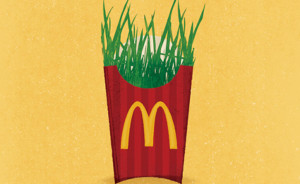It will come as no surprise that America is ranked as one of the top countries grappling with obesity, according to data from World Atlas (2016), along with North America being listed as the top continent where the obesity epidemic prevails the most. This issue begs the question what Americans and surrounding countries can do to curtail these high rankings and begin to embrace health and prosperity.
A direct correlation is fast food. While French fries and apple pies are good, not dying is better. McDonalds, Wendy’s In –N-Out Burger, and Jack and the Box provide scrumptious and convenient meals, but at what cost? Moderation is the key to dealing with any vice, even when that vice is food. Unfortunately, there are individuals who can’t control the intake of their fast food transforming what was once a casual vice into a full-blown addiction.
McDonalds has an interesting history with Corporate Social Responsibility (CSR) and company accountability. While the corporation continues to publish annual CSR reports that detail monetary and philanthropic donations, they do little to shift their menu to healthier options and smaller portions (McDonalds, 2016). The company continues to avidly market and produce high caloric options towards kids, attempting to seize a target audience at their most vulnerable beginnings (Reilly,2015).
However the complexities of the fast food industry and accountability are much more nuanced and have been up for discussion for decades. First and foremost, whose responsibility is it to address obesity issues and addictions in America? Is it the fast food corporations? The consumer? The government (Dier,2014)? Additionally, this topic is deeply rooted in issues of economic and class disparities amongst Americans. When you are a single mom struggling to financially put food on the table, quickly feeding your children a meal that costs ten dollars is compelling. Perhaps fast food corporations need to acknowledge these economic disparities and try to address the issues through community discussion and or governmental legislation in the form of smaller sizes or healthier options (p.2).
While this post begs many more questions than it provides answers, I think it continues to be a timely topic for discussion. I would love to hear all of your thoughts on this ongoing and interesting issue.
References
Dier, A. (2014). Study: It’s Not McDonald’s Fault Our Kids Are Fat. Newser.
doi:http://www.newser.com/story/180882/study-its-not-mcdonalds-fault-out-
kids-are-at.html
McDonalds (2016) Making a difference
http://www.aboutmcdonalds.com/mcd/sustainability.html
Reilly, L. (2015). McDonald’s slapped down for focusing its Happy Meal
advertising on the toy and not the food. Business Insider.
doi:http://www.businessinsider.com/mcdonalds-told-to-change-ads-by-
childrens-advertising-review-unit-2015-5
World Atlas (2016) 29 Most Obese Countries in the World.
http://www.worldatlas.com/articles/29-most-obese-countries-in-the-world.html



8 Responses to McDonalds, Obesity and Corporate Social Responsibility